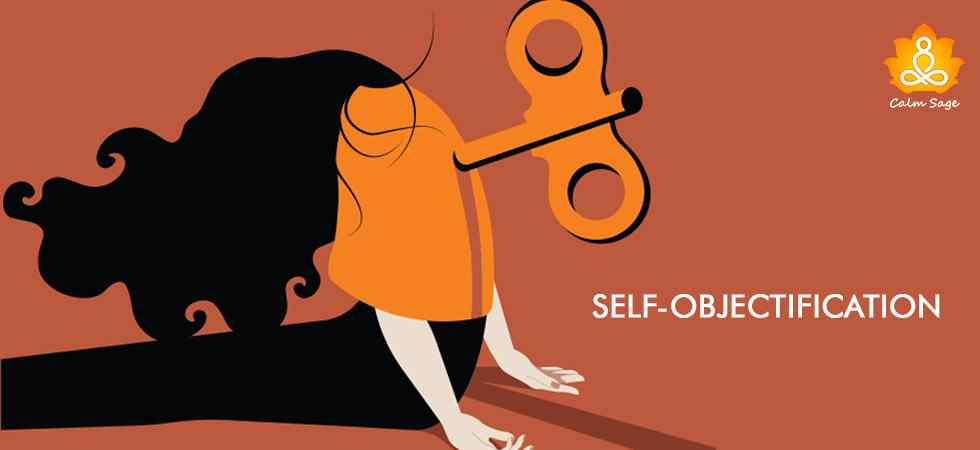Understanding The Dangers Of Self-Objectification! Ways To Cope

Self-objectification is a psychological mindset where one considers themselves to be an object before they are an individual. In simple words, these people see themselves as a material object and criticize or praise themselves based on that.
Self-objectification can raise a lot of concerns especially mentally and emotionally. You go into self-destruction mode because you don’t treat yourself as human. People who indulge in objectifying themselves want the materialistic aspect of themselves to be perfect.
The effect of self-objectification is usually manifested in body image issues, and self-worth issues and can result in low self-esteem as well. Not just that self-objectification can be the reason for severe mental health concerns like depression, obsessive-compulsive disorder, eating disorders, etc.
Let’s learn how to stop self-objectification but first, we’ll talk about self-objectification…
What Is Self-Objectification?

Self-objectification is the tendency to objectify oneself. When you indulge in self-objectification you first see yourself as an object and then as a human being. So you treat yourself like a lifeless object and don’t accept yourself as a human capable of making mistakes.
It is extremely inappropriate to treat anyone as an object, leaving yourself alone. When you objectify yourself, you start to make choices based on what you want your objective self to be. Self-objectification can negatively impact your mental and emotional well-being.
Self-objectification constantly makes you obsess over what others think of you, or how you look. In most cases self-objectification makes you develop body image issues, you want your body to look the best.
What Causes Self-Objectification?
There is no one particular cause of self-objectification. It depends on how an individual interprets others’ judgment about themselves. Does self-objectification cause low self-esteem issues or it’s the opposite?
There’s no concrete answer to that, I think both are correlated in such a way that each can be both the cause and effect of the other. However, self-objectification can be a product of constant scrutiny and objectification by others.
We may not know what exactly causes but we do know what can trigger self-objectification;
- Being objectified by others in the past
- Unsolicited remarks from people around you
- Feeling the need to fit in and be exactly how others think you should be
- The media’s representation of how a person should be
Impact Of Self-Objectification?
Self-objectification may look like a minor defect in someone’s thought process. What we fail to understand is that these tiny defects can cost you your mental peace. Imagine, you constantly judge your body according to a standard set by someone who doesn’t even know you.
Self-objectification can mess up your mind and how! Let’s look at a few negative consequences of self-objectification;
- Self-isolation
- Low self-worth
- Low self-esteem
- Self-image issues
- Body image issues
- Loneliness
- Anxiety and panic about you not being the perfect shape, color, size, etc
- Depressive thoughts and feelings
- Relationship issues
- Overthinking
Although self-objectification can happen across genders, women are more susceptible to it. Therefore you’ll see women fat-talk a lot about themselves. Before anyone tells them, they’ll only talk about how fat or thin they look or how bad their body has become. The media’s objectification also aids self-objectification in both men and women.

How To Stop Self-Objectification?
Self-objectification is something that will require some time to stop. You cannot just overcome self-objectification overnight. It’s easy to develop insecurities but quite difficult to get rid of them. However, with consistency and patience, there is nothing that you can’t do.
Here are a few things that you can do to stop self-objectification;
- Identify negative self-talk: self-objectification feeds on negative self-talk. The sooner you identify and question negative self-talk, the faster you’ll be able to stop self-objectification.
- Journaling: it is a good way to let your feelings out. The journal can also help you see where you go wrong. You can easily track and identify your triggers and how your chosen reaction is affecting you.
- Don’t believe everything that the media brings to your screen: the media wants to show you a pretty picture but that doesn’t mean it’s the correct picture. Limit unrealistic media exposure so that you don’t create false standards for yourself.
- Focus on your body: it’s important for you to take care of your body and not make painful choices just because you think you’ll fit in only if you are of a certain shape, color, size, etc. Listen to what your body is trying to say and do what gives you peace.
That’s All Folks!
I hope you found this blog about the dangers of self-objectification and how to stop self-objectification helpful and informative. Do share this blog with your friends and family so that no one falls victim to self-objectification and even if they do, they know what can be done.
Thanks for reading.
Take care and stay safe.




















